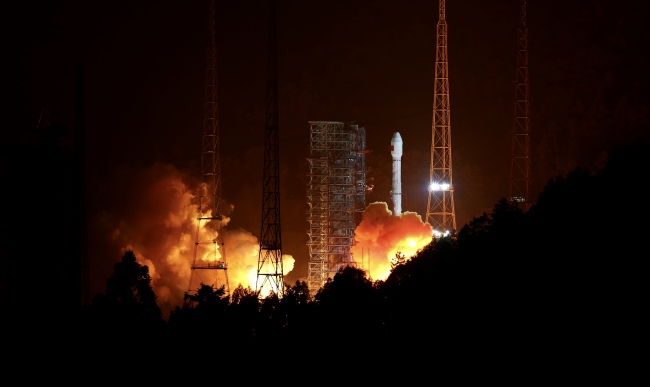


China launched two BeiDou-3 satellites via a single carrier rocket to support its global navigation and positioning network at 7:45 p.m. No. 5, 2017. [Photo: China Plus/Li Jin]
Beidou Navigation Satellite System (BDS), China’s homegrown satellite navigation system, is expected to become a standard smartphone location service, China Youth Daily reported on Jan. 22.
Beidou was first used in national security and other key fields. Since then, it has spread its service into a more complete chain, ranging from tiny chips, terminals to manufacturing and tertiary industries, said Ran Chengqi, director of China Satellite Navigation Office, and also spokesperson for the Beidou system.
Five years ago, foreign navigation satellite systems occupied the major market in China, though there were already over a dozen Beidou satellites launched into orbit. Five years on, a groundbreaking change has been seen in the application of the Beidou system.
In the past five years, over 4.8 million cars and more than 40 thousand fishing boats have adopted the Beidou system in China. By the end of 2017, the system had saved more than 10 thousand lives, earning the nickname “protector on the sea,” said the spokesperson, adding that some auto driving companies are developing chips that use the Beidou system.
Most mainstream chip makers have added China’s BDS to its solutions. Using Beidou will be a standard in China for enhanced location precision in smartphones, Ran revealed.
Support for BeiDou in China gives devices access to more satellites, increasing location accuracy to the meter and even centimeter level. This will improve customers’ pedestrian navigation, speed up local searches, and enhance other location-based services.
Beidou has established cooperation with its three main competitors, namely GPS, Galileo, and GLONASS by the US, the EU, and Russia, respectively. In December 2017, Beidou signed an agreement with GPS to approve the compatibility and interoperability of the two systems, gaining worldwide attention.
The BDS has been providing services for Asia-Pacific users, and plans to expand globally by the end of 2020. It will integrate itself into the global satellite navigation system to provide better services for global users.
 Fire brigade in Shanghai holds group wedding
Fire brigade in Shanghai holds group wedding Tourists enjoy ice sculptures in Datan Town, north China
Tourists enjoy ice sculptures in Datan Town, north China Sunset scenery of Dayan Pagoda in Xi'an
Sunset scenery of Dayan Pagoda in Xi'an Tourists have fun at scenic spot in Nanlong Town, NW China
Tourists have fun at scenic spot in Nanlong Town, NW China Harbin attracts tourists by making best use of ice in winter
Harbin attracts tourists by making best use of ice in winter In pics: FIS Alpine Ski Women's World Cup Slalom
In pics: FIS Alpine Ski Women's World Cup Slalom Black-necked cranes rest at reservoir in Lhunzhub County, Lhasa
Black-necked cranes rest at reservoir in Lhunzhub County, Lhasa China's FAST telescope will be available to foreign scientists in April
China's FAST telescope will be available to foreign scientists in April "She power" plays indispensable role in poverty alleviation
"She power" plays indispensable role in poverty alleviation Top 10 world news events of People's Daily in 2020
Top 10 world news events of People's Daily in 2020 Top 10 China news events of People's Daily in 2020
Top 10 China news events of People's Daily in 2020 Top 10 media buzzwords of 2020
Top 10 media buzzwords of 2020 Year-ender:10 major tourism stories of 2020
Year-ender:10 major tourism stories of 2020 No interference in Venezuelan issues
No interference in Venezuelan issues
 Biz prepares for trade spat
Biz prepares for trade spat
 Broadcasting Continent
Broadcasting Continent Australia wins Chinese CEOs as US loses
Australia wins Chinese CEOs as US loses